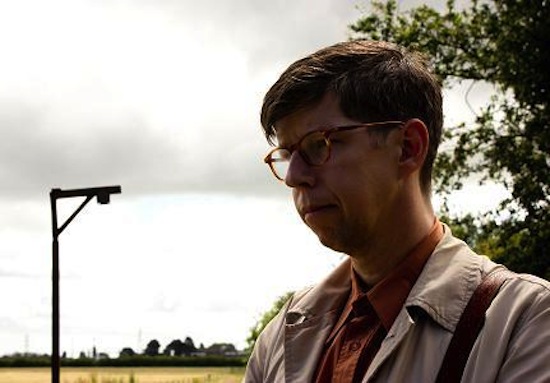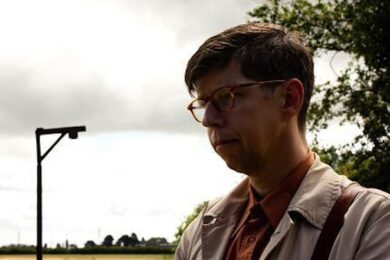Darren Hayman’s latest record, a double album with his band The Long Parliament about the Essex witch trials in the 1600s, is an intriguing prospect, especially coming from a songwriter usually associated with tales of everyday minutiae. The Violence, out now via Fortuna Pop, is the third in a trilogy of albums about Essex. The first, Pram Town, covered the creation of the ‘new towns’, such as Harlow, while its follow up Essex Arms told of life in the semi-rural liminal parts of the county. Completing the triumvirate, The Violence turns the clock back three and a half centuries, to the English Civil War.
We talked to Darren about the difficulties of telling historical stories through music, how free-improv has had an influence on the album and why crumhorns haven’t.
The first, and most pertinent question, is a simple ‘why?’
Darren Hayman: I had sort of just said, for some reason, that it was going to be a trilogy once I’d done Pram Town; I seemed to be writing quite easily about Essex. There’s one song on Essex Arms where I used woodwind, and there’s a couple of lyrics in ‘Nothing You Can Do About It’ where I was singing about the four humours (‘we are blood, we are phlegm, we are yellow and black bile’) and I quite liked that, using a language from another time. I was thinking about how lots of my lyrics rely on modern tropes. I use brand names and I use slang and I felt that that was becoming quite vogue, I felt that a lot of other people were doing that as well, whereas perhaps when I started there weren’t so many people doing it…
So that narrowed the idea down to doing something about Essex and doing something historical, mainly because I wanted this puzzle of trying to write songs without having those tricks at my disposal. My friend Julia was reading a book about the Essex witch trials and I thought "oh, well there’s loads there, there’s loads of things in that that would fit what I do." Moreover, the fact that I knew nothing about it is what made it exciting. So the first thing I had to do is find out about it. And it was hard. The reason why it’s taken so long is the writing, just constantly chucking stuff out. It’s very hard to impart the amount of information you need to without the exposition crumbling the songs.
That points to my next question actually. To what extent did you feel a duty to the subject matter?
DH: I don’t really want to make a record where someone might listen to it and go "what was that about? They were nice pretty songs." It would be a bit odd if you couldn’t take anything from it. But I also don’t want to make a record that you have to read; I don’t want it to feel like a history lesson. So somewhere in between those two points. And I suppose that question you’re asking is the question I’ve been asking myself, about how much of a need there is to tell the story. The secret to it, and the secret on Pram Town as well, if indeed I succeeded at all, is to find your emotional centre. So it’s going to be an album about 17th century witch trials and the English Civil War, but what is it about them that makes songs? It started to move forward when I decided that the main theme of it was going to be fear and it was actually going to be an album about being frightened and about how nasty people are often frightened, or how fear leads to the dark side. And also a little bit that thing that happened to me [in November 2009, Hayman suffered a fractured skull after he was attacked and mugged]. A little bit of that helped in a way, because I knew I couldn’t write directly about that because everyone had said "oh you’ll write a song about that." So I knew that everyone was looking for his ‘got beaten up song’, so I thought that was a way to deal with that. Then you’re able to just write songs that are about fear and then some songs can carry the information of the story a bit more than others.
How was the research process. Did you research it all first and then start writing?
DH: Yes I did. The problem I came across is that a lot of people who write about it are a little bit like Matthew Hopkins themselves, in that they seem to be enjoying the idea of witches having imps and all that kind of imagery. And I did as well: demons and trees and all the sort of rural gothic thing is quite fun to write. But I wanted it to be rationalist and humanist; I wanted it to be about persecution and fear. I think all the time with what I do I like to be no-nonsense. I don’t have a lot of patience for embellishments or poetics, but then what I’m doing is basically poetic, so I’m always trying to square those two things. As much research as I did, there’s still a lot of it that is supposition.
Some of it got pretty funny. I found out that a bird tapping at a window is a sign of oncoming death in many cultures. So then I started thinking, "well, I’m pretty sure they did have glass, yes, there’s glass in churches. But would a poor woman have had glass in her house or would it just have been wooden shutters?" And things like that became really important to me for the sake of the song. Another one was pillows, I had a line about sheets and a pillow and I thought "well hold on, maybe only the really rich people had pillows. What sort of linen did poor people have in the 17th century?" And I think that stuff does matter, to try and make a bit of an effort and get it all right makes the whole picture better.
English folk song is littered with songs about history, but I get the feeling that they aren’t really what inform this record are they?
You want to avoid [sings in flat monotone] "and Matthew Hopkins rode into the town on his horse to look for witches…" That’s when songs fail. That said, we have also recorded an album of English Civil War songs, we’ve done that in addition to making this record. And I find them hard. I find them hard to sing and I find it hard to find a way in. I find that direct storytelling hard. I think the way my songs work, and in fact the way most modern popular songs work, is around a moment. There’s not much you can put in a song, say only about twenty lines. So that’s what it is, it’s about finding the moments in the story that add up to a narrative when put together.
You say the writing was hard; what were the hardest bits of the history to translate into song?
DH: I wanted to write a song about iconoclasm. About how Puritans didn’t believe in any ornament and how they were stripping the altar rails out of the churches and how that set of beliefs eventually led to seeing ungodliness everywhere. That was really hard to write.
Musically, there’s some stuff happening that sounds a bit different to what you’ve done before and I was wondering if you’ve got any idea what might have fed into that.?
DH: I’ve become much more interested in chords. I spend a lot longer on chords. I think there are two things that are maybe influencing that. I think the first is listening to jazz more. It’s sometimes quite funny because I’ll make a chord choice and give it to the band or other musicians and they’ll say "that’s a bit weird, are you sure you mean that?" It’s interesting how music influences you by osmosis. I listen to a lot of free-improv and I would figure that that can’t really influence what I do, but I think it does; I think I’m developing an aural blindness to certain types of dissonance. The second thing is perhaps Robert Rotifer [Austrian-born singer-songwriter and broadcaster in whose band Darren, until recently, moonlighted on bass]. Having to work out basslines to Robert’s songs inspired me to try a little harder with chords. Furthermore, I knew the pace of the album would be slow and that it wouldn’t rock that hard, and that meant that the chord sequences could be more complex. I was mucking about with tunings a lot which is now kind of frustrating as I’m having to work out how to play some of them again.
How did the subject matter effect the musical choices?
DH: I did want it to quote slightly the time, in the same way that the lyrics did, but without necessarily being slavishly authentic. The lyrics had to have words from the time, but I’m still not using a 17th century sentence structure. In the same way there are electric guitars on there, and it’s not like I’m going out and finding crumhorns and stuff, but I wanted it to fit it a bit. I don’t know whether that idea fed into the notion that the chords could be more elaborate. In some ways the reason for doing a historical record was because I was curious about how to dress it. The thing that took so much time was writing the songs and the lyrics, but the thing I was really looking forward to was how to present it and make the music. So, in some ways it was about writing the songs for a musical idea I had which was something slow paced and layered. I built quite a few of the percussion tracks up on walks, recording things such as gates shutting. There are lots of woody little percussion things in the background which aren’t real instruments.



